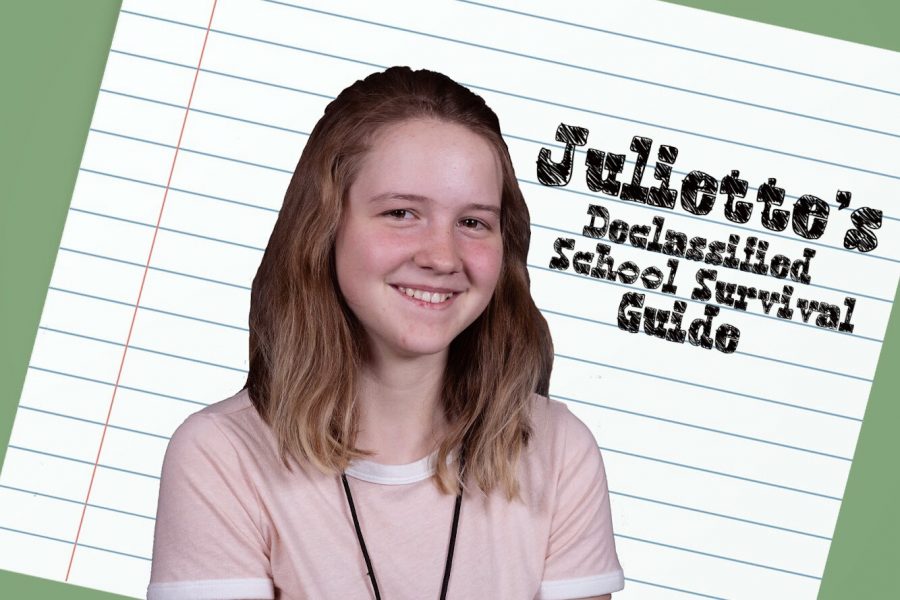Juliette’s Declassified School Survival Guide: October
Five approaches to writing your college essay
With most college apps due Dec. 1 and the rest usually in early January, the pressure is on for seniors. I turned in my early decision application Nov. 1 and my mom was astounded when she saw how different the process is now compared to when she was in school, before everything was computerized. Imagine a world without Common App or Naviance. Imagine having to fill out every application by hand and mail them yourself. Imagine having to buy stamps on top of every other fee. I cringe thinking about it.
As much as it might not feel like it, the college application process is so much easier now than in the past. It’s unbelievably convenient to have all your personal information and recommendation letters in one place, but unfortunately, not everything can be automated. The most unnerving and tedious part of the process is the essay.
If you’re so intimidated by the idea of describing yourself that you’re staring at a blank document, like most students do when they begin, strategizing which method to use might be a good place to start. There are several different approaches to take and each one suits a different kind of applicant.
1. Delayed approach
This approach lets you first write everything as if you had no word limit. Get all your ideas out on paper and afterward you can cut out all the fluff and trim it down to the proper size. This is the route I took, albeit by accident, and it worked perfectly for me. I’d written my whole paper with no idea there was a word limit and about two weeks before the essay was due I checked in with Common App just to make sure. A part of me died when I saw the 650 word max. I had 1,700.
Over the next week, I cut over 1,000 words of beating around the bush and completely restructured my format until it was nearly unrecognizable from my original draft. In the end, though, I ended with a final product I felt confident in. Ignoring the word limit at first ended up helping me because I felt unconstrained to write what I wanted to. While this method might seem a little roundabout for some, if you’re a creative-minded person, it might give you the freedom to express yourself without stress getting in the way of your process.
2. Outline approach
If you’re stumped on how to openly express yourself on paper, then taking a more structured path might help you start quicker. Try making a bulleted list of your points in order, and then continue to add to them, or let them be your thesis for body paragraphs. You’re less likely to veer off track with this method and colleges will appreciate your organizational skills. On the other hand, if you start rambling as you add to your thesis, then that could also be a good thing. In that case you may combine the delayed approach with this one and remember to reel yourself in later. Either way, it gets the ball rolling.
3. Narrative approach
Colleges ask for a personal essay because they want to get to know you as a person. They don’t need to know about your studying habits or your academic life — they can tell that from your GPA and SAT/ACT scores. If there’s a defining moment in your life that demonstrates something key about your potential and will make the audience feel like they know you, then that’s a great topic to write about. It may be easier for some people to get started on an essay that takes place in a specific point in time and it gives you a chance to show off your writing skills with clever approaches to narration and imagery that hook your audience.
4. Sampling approach
While some students struggle to find an idea to write about, others may be undecided between several ideas that all seem equally interesting. If you’re in this situation, you might be procrastinating on committing to any of them, fearing a wrong choice — but as any student knows, waiting never made any assignment easier. Try your hand at writing the first few paragraphs of each prompt and see which one comes naturally. Some prompts may sound interesting but turn out to be more difficult than expected and others almost write themselves. Choose the one that feels the best to you.
5. Metaphorical approach
If you know exactly what you want to tell a college (besides, “Please accept me!”) but don’t know how, the metaphorical approach may be for you. It’s a way to structure your essay around a specific message without being too obvious and it takes a lot more refining, but it’s worth it if done right. Choose the message you want to convey and then brainstorm scenarios, memories, metaphors, sayings or anything connected to that idea your mind can come up with and build your essay around one or two.
For example, take: “I’m a survivor who can adapt to any challenge.” You might think of topics like the TV show “Survivor,” or a liquid that adapts to the shape of its container, or a specific memory in your life where you demonstrated this quality. Now you have some specifics to work with, rather than an abstract concept you feel you have to blatantly state upfront. Represent this concept by showing, not telling.
Don’t forget, though, to state your point directly at some point later in the essay. College essays are no place for subtlety; it runs the risk of your readers missing the message. It will also make you seem bold and confident in your potential.








